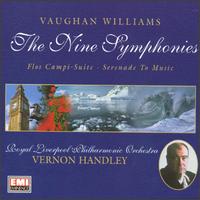 Ralph Vaughan Williams So you're looking for a good set of Vaughan Williams symphonies, eh? Well, screw you, as the ghost of Vaughan Williams would say. VW is a composer who would be exceedingly well-served by a complete edition, collecting all of his music into one place. Though a pretty conservative figure in 20th century music, he nevertheless wrote a vast amount of incredibly beautiful and stirring music – and at any rate, equating "radical" or "new" with "good" is often a huge mistake. What I like about Vaughan Williams is that he created music that is conventional and accessible, but not mindless or derivative. His symphonic voice in particular was a unique one, and he certainly can not be dismissed as a lightweight simply because he wrote in the classical tradition. Though I love quite a lot of more stereotypically dissonant and/or wacked-out 20th century music, I also love the melodies and drama in VW's writing. It's pretty, yes, but more than that, it's damn good from a compositional standpoint as well. A decided pastoral streak runs through the writing (loads of oboes, flutes, and strings), along with a brilliance with incorporating choral voices into symphonic works. So, yes, you're looking for a good set of Vaughan Williams symphonies. That's where it gets a bit difficult. Few full-on box sets have been issued of Vaughan Williams' work at all. The main symphony sets are available from Leonard Slatkin on RCA and Vernon Handley on EMI, both cycles recorded in the 90s. If a box set is what you need, you can't go wrong with either – this is tough music to play badly, and both Slatkin and Handley are very strong with these works. The edge in sound quality would probably go to Slatkin's set (though both are digital recordings), which also features a few more additional add-on pieces, where Handley's set only offers the "Serenade to Music" and the "Flos-Campi Suite" as bonuses. The performance edge might be handed to Handley, whose overall consistency seems a bit better. But as I said, either set is more than decent. The trouble is, neither box is really the ultimate – Sir Adrian Boult's 60s recordings for EMI (newly remastered) can be purchased individually and are much preferred – probably unsurpassable renditions of the symphonies, in my opinion. Just gorgeous recordings, too. And the Hyperion label has a tremendous amount of amazing Vaughan Williams material in their catalog, especially the choral pieces. So in the case of VW, I'd have to say you're better off cobbling an edition together from separate CDs than buying a set. That said, there are many attributes to having a set, not the least of which is convenience, as well as economy, and of course aesthetics. Personally, I go for a box if a really good one can be gotten, but when the available options are just not quite worth it, I skip it. I strongly prefer a box if possible. My problem with the Slatkin set is I just don't love the performances as I do the Boult recordings. The Handley set contains performances I like a lot, and my main objection to it is, sad to say, aesthetic. If it were packaged a bit better I'd probably be sitting here demanding that you go out and get it right away, it's ESSENTIAL. The music certainly is wonderful. It's one of those box sets that packages CDs that are available separately into a set with a slipcase, so there's not a great unity of design, which somewhat diminishes the power of the set – I mean, if you're going to have a set, it should look very enticing and uniform, no? I know I'm not the only aesthetic snob out there, though I may well be the only critic who consistently admits to it. I can't tell you much about the music other than I like it, but I can go into tremendously specific detail about the packaging elements! So, though this is not an inexpensive set, it looks a tad bit junky, with shoddily-designed covers featuring generic nature scenes and CD tray cards that leave much to be desired. The liner notes are very well-done, though. All this said, I certainly don't want to leave the impression that this is not a desirable set. It is, to my mind, the most desirable set out there of the VW symphonies. But ultimately, I'd have to recommend the Boult recordings, even though I'm pretty sure the entire cycle is not currently available on CD. Note to EMI – release a box, damn you! Note to whatever label is ambitious enough: release a complete VW edition! I'm not equipped sufficiently to detail the strengths and weaknesses of each performance in this set – it all sounds real good. My ability to differentiate different versions of classical pieces is highly impressionistic – I just go on whatever vibe I get from the performance, dig? The Handley set (recorded between 1986 and 1994) is solid through and through, but it's just kinda junky looking. To me, that's important, and I'm proud to be shallow enough to say so, especially since I'm pretentious enough to recommend a different cycle on supposedly musical grounds. For symphonies, go Boult on EMI; for choral stuff, go with Hyperion. Since these CDs are available separately and I wouldn't buy them that way, I can't in good conscience say that they're more appealing simply because the full set in a box gives me closure. (I reserve the right to reverse that statement the minute any of the aforementioned versions gets reissued in a smokin' lookin' box with really cool art direction.) I am SUCH a classical music authority!
Review by Richard Dickweed |